Title: Kigali to Lubanda (near Masaka)
Dates: 11th to 14th June GPS:
Distance: 379km Total Distance: 17,447km
Roads: Very hilly most of the way; tarmac apart from Lake Bunyoni Road
Weather: Comfortable, mid-high 20s, head and cross winds from south east
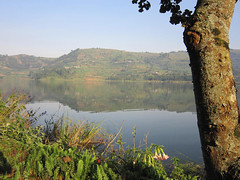 From Kigale it was a pretty straight forward ride along the main road, up through a stunning valley, over a pass and into Uganda, country number 17 of the journey. At Kabale, 20km into Uganda, we made a short diversion to stay at Lake Bunyoni. It was a seriously steep ride at the end of a long day up to the lip of the ancient crater lake, but the view well worth it. Kalebus Camp beside Lake Bunyoni was a terrific place to stay; great food and so tranquil in the morning.
From Kigale it was a pretty straight forward ride along the main road, up through a stunning valley, over a pass and into Uganda, country number 17 of the journey. At Kabale, 20km into Uganda, we made a short diversion to stay at Lake Bunyoni. It was a seriously steep ride at the end of a long day up to the lip of the ancient crater lake, but the view well worth it. Kalebus Camp beside Lake Bunyoni was a terrific place to stay; great food and so tranquil in the morning. 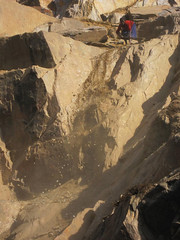 Returning to Kabale the next day however, one scene was quite a contrast. We stopped to have a closer look at a quarry and meet some of the workers. All generations were represented in the demographics; grandmothers, mothers, fathers, sons, children…and there were certainly no safety precautions in place. We watched women pushing gravel over the cliff face, perched in precarious positions – no harnesses, no shoes, no protection. Men broke rocks with sledge hammers and crow bars, women and children cracked smaller lumps of gravel. I read in a Ugandan newspaper that the wages earned by women nursery workers (picking flowers) was usually about $US1.20 per day, rising to $US1.50 after a year of service. I doubt these quarry workers were getting that. We’d just paid about $50 for four of us for camping, dinner and breakfast on the other side of the hill, yet here it would take a labourer more than a month to earn that amount.
Returning to Kabale the next day however, one scene was quite a contrast. We stopped to have a closer look at a quarry and meet some of the workers. All generations were represented in the demographics; grandmothers, mothers, fathers, sons, children…and there were certainly no safety precautions in place. We watched women pushing gravel over the cliff face, perched in precarious positions – no harnesses, no shoes, no protection. Men broke rocks with sledge hammers and crow bars, women and children cracked smaller lumps of gravel. I read in a Ugandan newspaper that the wages earned by women nursery workers (picking flowers) was usually about $US1.20 per day, rising to $US1.50 after a year of service. I doubt these quarry workers were getting that. We’d just paid about $50 for four of us for camping, dinner and breakfast on the other side of the hill, yet here it would take a labourer more than a month to earn that amount.
From Kabale I pedalled over some huge hills, a high plain and then more (smaller) hills; through Mbarara to reach the small market town of Kinoni, 20km from Masaka. At Kinoni we turned off to a small village called Lubanda to meet Helen Brown and learn about her HUG Project.
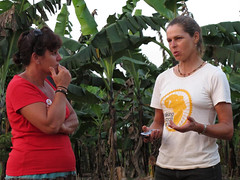 Helen first contacted me in response to an article in The Age newspaper in Melbourne. We very soon realised that we were on the same page with regard to the theme and purpose of our initiatives. Helen invited me to visit her project in Uganda. HUG stands for Help Us Grow. The not-for-profit organisation was set up by Helen and David Ssemwogerere. Helen and David’s paths crossed when Helen first visited Uganda to take part in another educational program. She had felt that there was a division between the organisation that she was working for and the Ugandan people whom she was teaching. HUG was set up by Helen and David to develop relationships between community members and volunteers so that both cultures learn from each other; two way relationships where the benefits go both ways to develop community spirit and resilience. As we arrived, Helen and David had just returned themselves from Kampala with a family of volunteers – the Tomaino family from Melbourne who were on their first trip to Africa.
Helen first contacted me in response to an article in The Age newspaper in Melbourne. We very soon realised that we were on the same page with regard to the theme and purpose of our initiatives. Helen invited me to visit her project in Uganda. HUG stands for Help Us Grow. The not-for-profit organisation was set up by Helen and David Ssemwogerere. Helen and David’s paths crossed when Helen first visited Uganda to take part in another educational program. She had felt that there was a division between the organisation that she was working for and the Ugandan people whom she was teaching. HUG was set up by Helen and David to develop relationships between community members and volunteers so that both cultures learn from each other; two way relationships where the benefits go both ways to develop community spirit and resilience. As we arrived, Helen and David had just returned themselves from Kampala with a family of volunteers – the Tomaino family from Melbourne who were on their first trip to Africa.
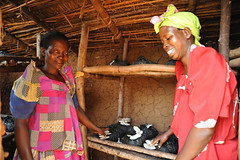 A surprise was in store as a group of about twenty women from the Lubanda community performed a traditional welcome for us. It was very special. Helen said that when they started 18 months ago, these women would not have had the self-confidence to give such a performance. Helen and David are reviving self-esteem and facilitating empowerment for a better, sustainable future. There are no huge budgets and no new LandCruisers here. This is a small grassroots organisation where initiatives are based on knowledge and skills transfer, community needs, simplicity and positive encouragement at a pace which suits the lifestyle. Volunteers become part of the community and learn just as much from the locals. The idea is to harness volunteers’ skills and put them to use in the various programs. Everyone gets something different out of HUG. The motivation comes from within. There are no hand outs here. Seeds, mushroom spore and animals are provided as loans to be repaid and certain commitments are required. We spent a very relaxed and interesting day with Helen, David and the volunteers looking at some of their initiatives in Lubanda and in the new Suubi Education Centre.
A surprise was in store as a group of about twenty women from the Lubanda community performed a traditional welcome for us. It was very special. Helen said that when they started 18 months ago, these women would not have had the self-confidence to give such a performance. Helen and David are reviving self-esteem and facilitating empowerment for a better, sustainable future. There are no huge budgets and no new LandCruisers here. This is a small grassroots organisation where initiatives are based on knowledge and skills transfer, community needs, simplicity and positive encouragement at a pace which suits the lifestyle. Volunteers become part of the community and learn just as much from the locals. The idea is to harness volunteers’ skills and put them to use in the various programs. Everyone gets something different out of HUG. The motivation comes from within. There are no hand outs here. Seeds, mushroom spore and animals are provided as loans to be repaid and certain commitments are required. We spent a very relaxed and interesting day with Helen, David and the volunteers looking at some of their initiatives in Lubanda and in the new Suubi Education Centre.
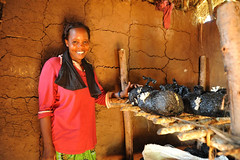 After breakfast in the Suubi Centre we set off on a walking tour of some of the projects around the village. Firstly we had a look at their mushroom project. Initially six women were sent to Kabale to learn how to grow them. They in turn trained another group of ten women who were willing to make the commitment. Before being loaned the spores they had to build a mushroom house, usually out of mud, with a dark and a light room. The spores were repaid to provide the next group of women with an opportunity. They had to learn how to process and dry the mushrooms before they were sold to the guaranteed export market in Kabale. Their success provides extra income and they learn how to manage their savings as well as business skills.
After breakfast in the Suubi Centre we set off on a walking tour of some of the projects around the village. Firstly we had a look at their mushroom project. Initially six women were sent to Kabale to learn how to grow them. They in turn trained another group of ten women who were willing to make the commitment. Before being loaned the spores they had to build a mushroom house, usually out of mud, with a dark and a light room. The spores were repaid to provide the next group of women with an opportunity. They had to learn how to process and dry the mushrooms before they were sold to the guaranteed export market in Kabale. Their success provides extra income and they learn how to manage their savings as well as business skills.
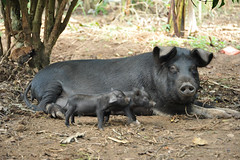 Next was the piglet project. Again very simple, but effective. Australians have donated piglets for Christmas. Instead of giving someone a present, they give a voucher saying they have donated a pig to a specific person in Lubanda (or surrounding villages). When the sows produce, the recipient has to agree to give two piglets from their first litter to another two people. They then have to make the same commitment. We met Babirye, one of the first recipients. Babiyre showed us her very large sow of which she was very proud.
Next was the piglet project. Again very simple, but effective. Australians have donated piglets for Christmas. Instead of giving someone a present, they give a voucher saying they have donated a pig to a specific person in Lubanda (or surrounding villages). When the sows produce, the recipient has to agree to give two piglets from their first litter to another two people. They then have to make the same commitment. We met Babirye, one of the first recipients. Babiyre showed us her very large sow of which she was very proud.
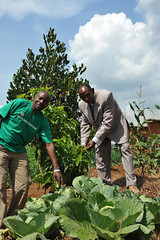 Bright Light Primary School was the final stop on the tour. Here Helen and David have helped the head teacher develop the school garden. The head teacher was sent to Jinja to take part in a training course. There he learned about fertilizing, mulching, growing different types of vegetables and fruit – many not normally grown in the limited traditional vegetable gardens. The diet around these parts would normally be maize, cassava, tomatoes, bananas, onions, some local greens (can’t remember the name) and not much else. The garden was impressive and the head teacher seemed very pleased with it. Some of the produce is used for the children’s meals and the rest is sold to create an income to buy in the staple foods – maize and beans. The garden isn’t big enough to provide all 600-odd students with food all year round. The garden is also an outdoor laboratory providing a medium for learning across a number of subjects from mathematics to health, agriculture and science. It is intended that what they learn at school is practiced at home. The primary school has also benefitted from the donation of an Australian school which raised enough money to provide a rainwater tank and gardening tools. Another very appropriate partnership where both sides learn and grow.
Bright Light Primary School was the final stop on the tour. Here Helen and David have helped the head teacher develop the school garden. The head teacher was sent to Jinja to take part in a training course. There he learned about fertilizing, mulching, growing different types of vegetables and fruit – many not normally grown in the limited traditional vegetable gardens. The diet around these parts would normally be maize, cassava, tomatoes, bananas, onions, some local greens (can’t remember the name) and not much else. The garden was impressive and the head teacher seemed very pleased with it. Some of the produce is used for the children’s meals and the rest is sold to create an income to buy in the staple foods – maize and beans. The garden isn’t big enough to provide all 600-odd students with food all year round. The garden is also an outdoor laboratory providing a medium for learning across a number of subjects from mathematics to health, agriculture and science. It is intended that what they learn at school is practiced at home. The primary school has also benefitted from the donation of an Australian school which raised enough money to provide a rainwater tank and gardening tools. Another very appropriate partnership where both sides learn and grow.
Helen says they try to match up people’s interests. Musicians give drums and other instruments for example. They organise and encourage sports, music and drama events to develop confidence and reconnect with skills they have traditionally been good at. Uganda has had a tough time in recent history due to the regimes of cruel, oppressive dictators such as Idi Amin and his successor in the 70s and early 80s. There was a major conflict with Tanzania which would have affected this region. People here aren’t suffering from extreme poverty anymore, but HUG is helping people move out of a vulnerable zone to become more resilient and better able to cope with hard times. All around, the villagers look happy and healthy.
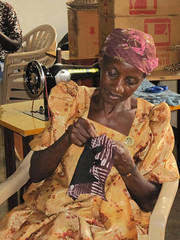 Back at the Suubi Centre we watched a sewing class. Many women have never developed skills such as drawing, cutting and needlework. Skills were being taught from scratch and both local women and volunteer teachers (like Jan and Sue) were gaining much out of their roles.
Back at the Suubi Centre we watched a sewing class. Many women have never developed skills such as drawing, cutting and needlework. Skills were being taught from scratch and both local women and volunteer teachers (like Jan and Sue) were gaining much out of their roles.
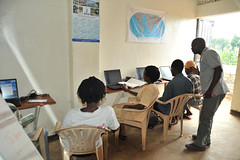 Musicians and dancers were practicing for the World Environment Day celebrations (which took place last week and by all reports was a great success) and a computer class was in progress for adult business people. The demonstration garden beside the Suubi Centre is where farmers learn to produce higher yielding crops, using better varieties. Positive results are proof enough for locals to adopt new techniques and encourage learning. There are plans to do more for the men in the community, but this is a young organisation and Helen said they need to ensure each project is up, running and self-sustaining before they introduce more ideas. There are also plans for a health centre.
Musicians and dancers were practicing for the World Environment Day celebrations (which took place last week and by all reports was a great success) and a computer class was in progress for adult business people. The demonstration garden beside the Suubi Centre is where farmers learn to produce higher yielding crops, using better varieties. Positive results are proof enough for locals to adopt new techniques and encourage learning. There are plans to do more for the men in the community, but this is a young organisation and Helen said they need to ensure each project is up, running and self-sustaining before they introduce more ideas. There are also plans for a health centre.
The women cooked our meals using home grown produce. Initially they had problems with quantity, and the timing of meals, but now they are able to plan and cook great local dishes so that they are ready on time.
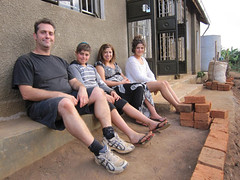 Spending a day (and two nights) at Suubi was like staying with one big friendly family. Everyone chipped in and seemed to be having a great time. It was refreshing to watch the reactions of the Tomaino family – straight out of comfortable Melbourne to rural Uganda. There are no Play Stations or televisions here, but Lucynda and Christian seemed to be fully engaged with the local kids and being a part of what was going on. The Tomainos were just there for two weeks, however retired volunteers such as Terry, Sue and Jan could stay for much longer and had different sets of skills to contribute. Helen mentioned that she is looking to encourage the corporate world to get involved in similar ways to the present volunteers but paying more for their stay in the banda accommodation and combining this with some sightseeing in Uganda.
Spending a day (and two nights) at Suubi was like staying with one big friendly family. Everyone chipped in and seemed to be having a great time. It was refreshing to watch the reactions of the Tomaino family – straight out of comfortable Melbourne to rural Uganda. There are no Play Stations or televisions here, but Lucynda and Christian seemed to be fully engaged with the local kids and being a part of what was going on. The Tomainos were just there for two weeks, however retired volunteers such as Terry, Sue and Jan could stay for much longer and had different sets of skills to contribute. Helen mentioned that she is looking to encourage the corporate world to get involved in similar ways to the present volunteers but paying more for their stay in the banda accommodation and combining this with some sightseeing in Uganda.
The following day, we all lined up below the new Suubi sign for some photos. All too soon it was time to go. David dropped me off back in Kinoni and I set off on one very long day to Kampala.
To find out more about HUG please visit www.hug.org.au.
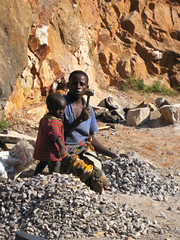
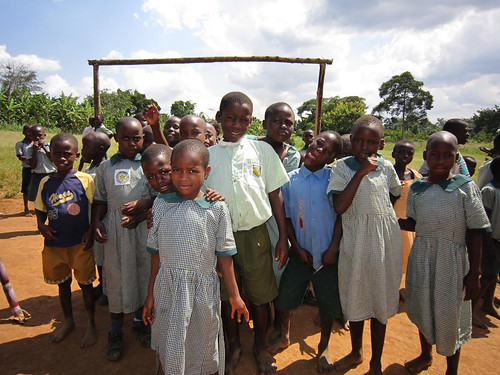



{ 3 comments… read them below or add one }
Hey Kate, just a short hello to let you know that we’re thinking of you. Geoff & Dina x
Hi Dina and Geoff,
Just 5 weeks to go and it will all be finished. The Somalia section is a bit complicated, but we can sort it out.
All the best,
Kate
Congratulations Kate. You challenge and inspire us all. Bring on your book and film. Age reader, Ray Higgs.